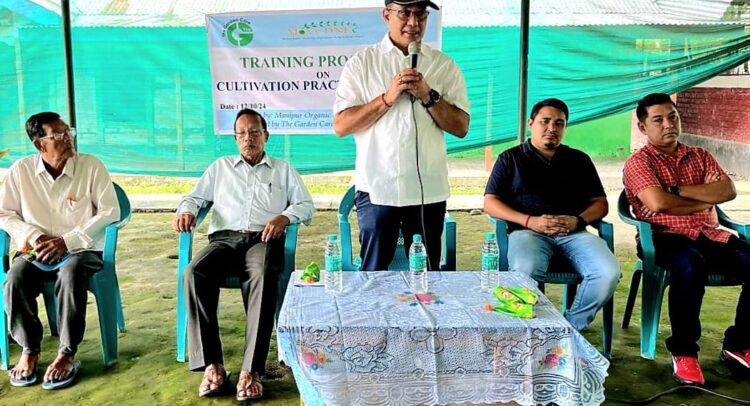Asem Bhakta, Special Correspondent North East
Imphal: Service provider “The Garden Care” organized a training under the scheme of Mission Organic Value Chain Development for North Eastern Region (MOVCDNER), with the initiative of the Hon’ble Chief Minister of Manipur. The event, held on 12th October 2024 at Moidangpok, was chaired by Shri. K. Debadutta Sharma, Director of Horticulture & Soil Conservation, Government of Manipur. The training aimed at equipping farmers with updated technologies for Field Pea cultivation, while promoting sustainability and economic revival in the farming sector. During his address, he provided a detailed explanation of the cultivation practices for Field Pea, covering the day-to-day materials required for optimal production. He discussed the importance of using high-quality seeds, proper land preparation, timely sowing, and efficient irrigation management. He further emphasized the application of organic fertilizers such as compost and vermicompost to improve soil fertility and shared guidance on pest and disease management using eco-friendly methods. The Director outlined the practical steps for spacing, weeding, mulching, and harvesting techniques to maximize yield. He emphasized that following updated practices will not only increase production efficiency but also reduce input costs, leading to better profits for farmers. The Director also elaborated on the setup of vermicomposting units with a small budget, encouraging farmers to adopt this low-cost, eco-friendly practice for organic waste management. He explained that small-scale vermicompost units can be established using locally available materials, benefiting both the environment and the fertility of the soil. Additionally, Shri K. Debadutta Sharma acknowledged the farmer economy revival and livelihood generation programme, implemented by the Manipur Organic Mission Agency (MOMA) under the guidance of the Hon’ble Chief Minister. He assured that this programme would be carried out through local bodies, societies, and associations, with support from government and private experts to provide training, handholding, and monitoring services. The Director also assured that the necessary equipment such as water pumps and drip irrigation systems would be provided to improve agricultural productivity. He stressed the need for better market arrangements to ensure farmers receive fair prices for their produce. The training was well-received, with farmers expressing keen interest in adopting the updated cultivation practices and establishing vermicomposting units to achieve sustainable growth, enhanced production, and improved livelihoods.


